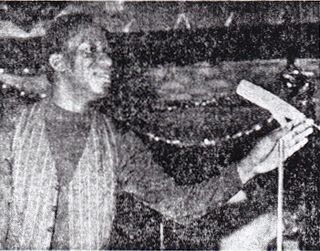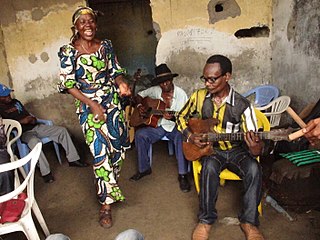Swing music is a style of jazz that developed in the United States during the late 1920s and early 1930s. It became nationally popular from the mid-1930s. Swing bands usually featured soloists who would improvise on the melody over the arrangement. The danceable swing style of big bands and bandleaders such as Benny Goodman was the dominant form of American popular music from 1935 to 1946, known as the swing era, when people were dancing the Lindy Hop. The verb "to swing" is also used as a term of praise for playing that has a strong groove or drive. Musicians of the swing era include Duke Ellington, Benny Goodman, Count Basie, Cab Calloway, Benny Carter, Jimmy Dorsey, Tommy Dorsey, Woody Herman, Earl Hines, Bunny Berigan, Harry James, Lionel Hampton, Glenn Miller, Artie Shaw, Jimmie Lunceford, and Django Reinhardt.

As it is in other countries, the music in Tanzania is constantly undergoing changes, and varies by location, people, settings and occasion. The five music genres in Tanzania, as defined by BASATA are, ngoma, dansi, kwaya, and taarab, with bongo flava being added in 2001. Singeli has since the mid-2000s been an unofficial music of uswahilini, unplanned communities in Dar es Salaam, and is the newest mainstream genre since 2020.

Congolese music is one of the most influential music forms of the African continent. Since the 1930s, Congolese musicians have had a huge impact on the African musical scene and elsewhere. Many contemporary genres of music, such as Kenyan Benga and Colombian Champeta, have been heavily influenced by Congolese music. In 2021, Congolese rumba joined other living traditions such as Jamaican reggae music and Cuban rumba on UNESCO's "intangible cultural heritage of humanity" list.

Senegal's music is best known abroad due to the popularity of mbalax, a development of conservative music from different ethnic groups and sabar drumming popularized internationally by Youssou N'Dour.

Soukous is a genre of dance music originating from the Democratic Republic of the Congo and the Republic of the Congo. It derived from Congolese rumba in the 1960s, with faster dance rhythms and bright, intricate guitar improvisation, and gained popularity in the 1980s in France. Although often used by journalists as a synonym for Congolese rumba, both the music and dance associated with soukous differ from more traditional rumba, especially in its higher tempo, song structures and longer dance sequences.

Israeli rock is rock music created by Israeli bands and singers.

Pascal-Emmanuel Sinamoyi Tabu, better known as Tabu Ley Rochereau, was a leading African rumba singer-songwriter from the Democratic Republic of the Congo. He was the leader of Orchestre Afrisa International, as well as one of Africa's most influential vocalists and prolific songwriters. Along with guitarist Dr Nico Kasanda, Tabu Ley pioneered soukous and internationalised his music by fusing elements of Congolese folk music with Cuban, Caribbean and Latin American rumba. He has been described as "the Congolese personality who, along with Mobutu, marked Africa's 20th century history." He was dubbed "the African Elvis" by the Los Angeles Times. After the fall of the Mobutu regime, Tabu Ley also pursued a political career. His musical career ran parallel to the other great Congolese rhumba bandleader and rival Franco Luambo Makiadi who ran the band TPOK Jazz throughout the 1960s, 1970s and '80s.

Following Tanganyika's independence (1961) and unification with Zanzibar (1964), leading to the formation of the state of Tanzania, President Julius Nyerere emphasised a need to construct a national identity for the citizens of the new country. To achieve this, Nyerere provided what has been regarded by some commentators as one of the most successful cases of ethnic repression and identity transformation in Africa.

Nicolas Kasanda wa Mikalay, popularly known as Docteur Nico, was a guitarist, composer and one of the pioneers of Congolese music. He was born in Mikalayi in the Belgian Congo. He graduated in 1957 as a technical teacher, but inspired by his musical family, he took up the guitar and in time became a virtuoso soloist.

Congolese rumba, also known as African rumba, is a dance music genre originating from the Republic of the Congo and Democratic Republic of the Congo. With its rhythms, melodies, and lyrics, Congolese rumba has gained global recognition and remains an integral part of African music heritage. In December 2021, it was added to the UNESCO list of intangible cultural heritage.
Muziki wa dansi, or simply dansi, is a Tanzanian music genre, derivative of Congolese soukous and Congolese rumba. It is sometimes called Swahili jazz because most dansi lyrics are in Swahili, and "jazz" is an umbrella term used in Central and Eastern Africa to refer to soukous, highlife, and other dance music and big band genres. Muziki wa dansi can also be referred to as Tanzanian rumba, as "african rumba" is another name for soukous.
Ramazani "Remmy" Mtoro Ongala was a Tanzanian guitarist and singer. Ongala was born in Kindu, in what was the Belgian Congo at the time, and now is the Democratic Republic of the Congo.
The Cuban Marimba Band was an influential Tanzanian big band from the city of Morogoro. It was founded in 1948 by Salum Abdullah, who had previously formed the Morogoro Jazz Band. For about twenty years, Cuban Marimba was one of the most popular muziki wa dansi bands in Tanzania.
International Orchestra Safari Sound was a popular muziki wa dansi Tanzanian band from 1985 to 1992.
DDC Mlimani Park Orchestra has been one of the most popular Tanzanian muziki wa dansi bands.
Msondo Ngoma is a Tanzanian muziki wa dansi band. Having been established in 1964, it is the oldest active dansi band in Tanzania.
Vijana Jazz Orchestra is a Tanzanian muziki wa dansi band that reached its peak of popularity in the 1980s. As with many other dansi bands of the times, it was sponsored by a government institution, namely the Umoja wa Vijana, i.e., the youth wing of Tanzania's ruling party Tanganyika African National Union (TANU).
Orchestra Safari Sound (OSS) was a major Tanzanian muziki wa dansi band in the 1970s. Along with Orchestra Maquis Original, OSS contributed to the evolution of dansi, introducing a slower-paced and more melodic style that further differentiated dansi from its ancestor genre, the Congolese soukous. The band was led by Ndala Kasheba, one of the most popular musicians in Tanzanian pop music.
Musa Juma Mumbo was a rumba and Benga musician from Kenya. He was born to the second wife of his father, a policeman, who had three wives and a total of 18 children. He grew up in Homabay where he attended primary and secondary schools. He began singing and playing instruments at a young age. His first instruments were guitars and drums made from tins and strings. He was the bandleader, guitarist and composer for Orchestra Limpopo International. Most of his music was sung in Luo language. Some of his songs are a fusion of the Luo and Congolese musical styles. He also sang in Kiswahili and English.
Kasaloo Kyanga was a Congolese musician, guitarist, and composer. Kyanga's compositions, including the hit song "Masafa Marefu", composed with Tancut Almasi Orchestra, continue to be performed by musicians. His other hit songs include "Nimemkaribisha Nyoka", "Butinini", "Kashasha", and "Kambwembwe".








